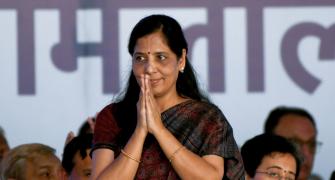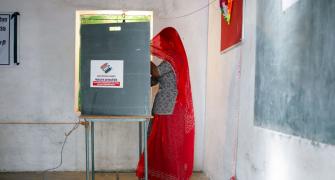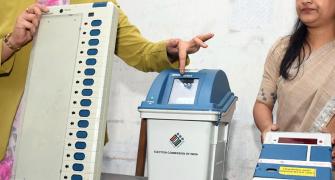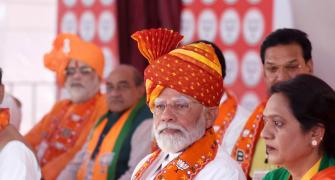As allies and opponents of the US-led occupation of Iraq swung behind the UN text to legitimise the Baghdad government, saboteurs blew up part of the Kirkuk-Turkey pipeline, the second such attack in less than 24 hours.
The pipeline was still ablaze Wednesday afternoon, said Northern Oil Co. fire chief Jumaa Ahmad.
Another pipeline, linking a power station to Iraq's largest fuel refinery at Baiji, 200 kilometres (120 miles) north of Baghdad, was also ablaze on Wednesday after an overnight attack.
The 400-megawatt power station was shut down in Baiji and the town was suffering a huge blackout.
US marines on Wednesday blocked off the eastern and southern entrances to the Iraqi Sunni Muslim rebel bastion of Fallujah, stringing barbed wire and placing cement barriers, an AFP correspondent said.
But a marine spokesman denied the US forces were shutting off the city, which lies 50 km west of Baghdad and was the scene of heavy fighting between US troops and Sunni fighters in April.
"We are not conducting any offensive operations in Fallujah," insisted Major T.V. Johnson. Some 15 tanks were deployed on a road about one kilometre east of a US checkpoint on the border of the city. They later pulled out.
Meanwhile, the US military reported that two bodyguards for a Baghdad politician were shot dead by assailants in an assassination bid on Tuesday. Bodyguards of local officials viewed as cooperating with US-led forces, and private security contractors hired to guard mainly-US firms in the lucrative work of rebuilding Iraq, have been a frequent targets of shootings and kidnapping.
Three Italian security guards, who were seized in Iraq nearly two months ago, received an emotional welcome home as they touched down in Rome on Wednesday. They had been freed by coalition troops 24 hours earlier. One of their colleagues was killed by their captors the day after the kidnap.
In northwestern Baghdad, thick black smoke billowed from a truck after gunmen in a speeding car raked a US military convoy, Iraqi witnesses and a US soldier said. A military spokeswoman said two civilian contractors were hurt in an ambush.
A crowd, caring little for the niceties of the diplomatic blessing conferred on the troops by the UN text, gathered to curse the firemen dousing the flames and demand they let it burn.
The incident underlined the dislike of US-led troops, who are often forced to fire warning shots to disperse hostile crowds who gather at each opportunity. Communal tensions between Iraq's Shiites and Kurds also simmered in Baghdad, over the adoption of the UN resolution.
The text failed to refer explicitly to Iraq's Transitional administrative Law (TAL), a temporary law that sets out Iraq's political future until a fully elected government takes control, said public works minister Nasreen Barwari.
"As a Kurd and as a woman I am disappointed that it (the UN resolution) does not recognize the TAL as a future basis for a constitution," said Barwari.
Kurds fear the Shiite majority will try to change the TAL, taking away their rights to self-rule and stripping them of their implicit veto over a permanent constitution, which is to be put before a referendum at the end of 2005.
The interim law gives Iraqis their first bill of rights, establishes the first-ever quota of women in a future parliament and enshrines Iraq as a federal state -- a key desire for the country's north-based Kurds.
But influential Shiite cleric Grand Ayatollah Ali al-Sistani has refused to recognize the interim constitution, which he sees as drawn up by the US-picked Governing Council set up after Saddam Hussein's overthrow in 2003.
The TAL was passed in March by the council, which was dissolved June 1 and a new interim government set up ahead of the June 30 return of a measure of sovereignty by US-led occupation forces.
"That document paves the way for a true democracy," Barwari argued.
"I feel threatened," she said, explaining that the fate of the rights incorporated in the text were "all up in the air and I am not sure that they will be adopted."
But internationally, the world applauded the resolution. Countries such as France, Germany China and Russia, who had opposed Washington's policy in Iraq, welcomed it as a milestone or a major step forward.
But there was caution too over expecting too much too soon.
Russian President Vladimir Putin said: "Naturally, it will take quite a long time before the adoption of this document will have any impact on the real change on the ground in Iraq."
British Prime Minister Tony Blair, Washington's staunchest ally, said everyone wanted to put behind them the divisions of the past and "unite behind the vision of a modern, democratic and stable Iraq that can be a force for good, not just for Iraqis but for the whole region and thus the whole world."
Australian Prime Minister John Howard, welcoming the resolution, warned: "I think what it will do in the short-term, it might strengthen the resolve of some people to indulge in more violence."
And EU external relations commissioner Chris Patten said that Iraq was facing a make-or-break phase.
"It is in all our interests that Iraq should develop into a stable, democratic country at peace with its neighbours." But, he added: "The next few months are likely to be make or break for Iraq's transition."
AFP







